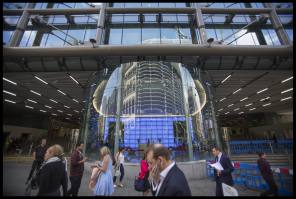

Toby Nangle,who runs the £1.2bn Threadneedle Dynamic Real Return fund, has changed his mind about the prospects for US equities.
Mr Nangle said until recently he had disliked US equities as an asset class, as he felt the improved outlook for global economic growth and higher inflation would benefit European, emerging market and Japanese equities more than those of the US.
This is because, using the business cycle theory of economics popular with many fund managers, when inflation and global growth rise, interest rates in those economies which have grown fastest to that point start to rise quickly.
This is because policymakers worry that rising inflation occurring in an economy that has already been growing for years will lead to an unsustainable boom in credit, and a steep recession.
In order to prevent this, central banks put interest rates up, this would be expected to reduce borrowing and demand in the economy, and may cause a mild recession.
Andy Haldane, chief economist of the Bank of England, has said it is always better for the economy that rates increase, even if this causes a sharp slowdown in growth, as it prevents a deeper recession.
Some investors, examining that scenario, reduce their exposure to the market and economy.
So investors such as Mr Nangle seek to invest in the equity markets of countries and regions where growth prospects are only beginning to improve, as interest rates are a long way from rising.
Peter Elston, chief investment officer at Seneca, has been avoiding US and UK equities for some time as he feels those are the global economies closest to the point in the cycle where rates begin to rise sharply.
But Mr Nangle has now upgraded his view of US equities on the basis that company earnings have been strong, which, if the economy really was in the late stages of its economic cycle, as the interest rate increases that have happened to date should have pushed demand downwards in the economy and reduced company earnings.
Mr Nangle said: “Since the end of 2016, the US equity market has been the worst-performing major market in common currency terms, and this has been consistent with our outlook of steady global growth and reflation, where we would expect emerging markets, Europe and Japan to outperform.
"However, the recent earnings season has been surprisingly strong in the US, and importantly the strength has not been completely tax reform-driven, as evidenced by upward revisions to forward EBIT (earnings before interest and taxes) growth.
"Using this same metric, prospective emerging market and European earnings growth are being held back by currency movements, while Japanese data has broadly met expectations, making the US performance surprisingly encouraging.
"This year, US equities have performed in line with global equities, lagging Japanese and European markets, with the absence of outperformance suggesting the US administration’s tax cuts had been previously discounted by markets. However, factoring in these recent earnings upgrades that signal improving fundamentals beyond the improved tax environment, we believe the US equity market looks to have cheapened year-to-date.
"This, coupled with the fact that the US market continues to play host to dominant global players that are attracting investment, warrants our upgrade to neutral from dislike.”
Neil Birrell, chief investment officer at Premier, said he has been selling the private equity fund investments in the mandates he runs, and buying global equities instead.
He said the volatile market conditions of February and March served to make equities cheaper, and so worth buying.
david.thorpe@ft.com



